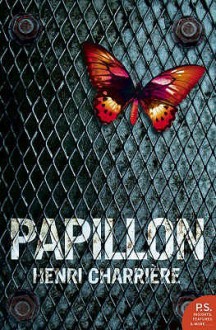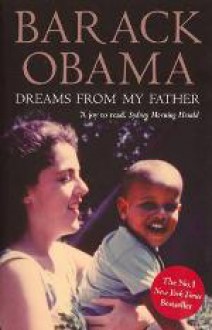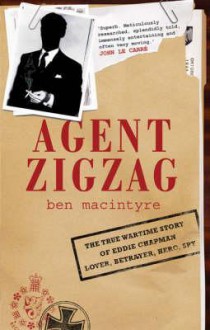
16/6 - Knowing nothing about this book or Charrière, only knowing the word papillon and it's English translation through the fact that there's a dog breed that's called papillon because the dog's fluffy ears (vaguely) resemble a butterfly's wings, I picked this up off the 'new and recently returned' shelf because the blurb on the back described it as "A classic memoir of prison breaks and adventure". And 'adventure' sounded like the right genre for me at that moment in time. I read the translator's introduction last night and I'm looking forward to reading a big chunk of it tonight. To be continued...
19/6 - I don't recommend reading this book if you have a strong sense of injustice, you may get the near-uncontrollable need to stab something. I like to midnight-snack while I do my nightly reading and in a number of places over the last hundred pages I found myself rage-eating my chips - just shovelling them in, too angry with the injustice of Henri's situation to enjoy them. Usually I eat them slowly, one or two per page, savouring them so that I don't accidentally eat a whole bag in one night, something which I could easily have done while reading this book last night. To be continued...
Later - I'm a bit disappointed with Charrière's description of his encounter with the lepers. He talks about a man who hands him a cup of coffee and then exclaims "Oh, where's my finger gone?". Henri finds it stuck to the outside of his cup and hands it back to him. According to Wikipedia this sequence is impossible, leprosy, despite all the old wives' tales, does not lead to body parts falling off here, there and everywhere. This next passage is taken straight from Wikipedia's page on leprosy
"Initially, infections are without symptoms and typically remain this way for 5 to as long as 20 years. Symptoms that develop include granulomas (loosely described as 'a small nodule') of the nerves, respiratory tract, skin, and eyes. This may result in a lack of ability to feel pain and thus loss of parts of extremities due to repeated injuries. Weakness and poor eyesight may also be present.
To reiterate, the loss of body parts happens because of repeated injuries to these body parts, which have become numbed due to granulomas of the nerves. There is no "Oh, my finger just fell off.", it's more like "Oops, I just accidentally chopped my finger off while chopping the carrots, but due to the granulomas it doesn't actually hurt." Below is a second passage taken straight from Wikipedia rephrasing what I've just written, only coming from a more official source.
"Leprosy is primarily a granulomatous disease of the peripheral nerves and mucosa of the upper respiratory tract; skin lesions (light or dark patches) are the primary external sign. If untreated, leprosy can progress and cause permanent damage to the skin, nerves, limbs, and eyes. Contrary to folklore, leprosy does not cause body parts to fall off, although they can become numb or diseased as a result of secondary infections; these occur as a result of the body's defences being compromised by the primary disease. Secondary infections, in turn, can result in tissue loss causing fingers and toes to become shortened and deformed, as cartilage is absorbed into the body."
So, therefore that part of the scene must be a figment of Charrière's imagination as that man's finger cannot have just come off without some kind of trauma happening to it first. Silly little exaggerations (possibly playing to the public's horrified fascination with the disease and the people who suffer from it) like that could lead to a reader doubting half of what Charrière has written in this book (some of it is pretty fantastical). I don't like feeling that what Charrière has written isn't completely true. I want it all to be true, not because I want anyone to have been through what Charrière went through (and I'm only 21% of the way through), but because I want to know that it's not all made up. That his main motive for writing this tale of injustice wasn't to make a pile of cash, but to let the world know of what he went through. To be continued...
20/6 - Why oh why, Henri, did you leave those lovely Goajira 'Indians'? You had everything you needed, not one but two loving wives both pregnant with your child (not a comment on the fact that one of the wives was not much more than 12, or that the two girls were sisters, just a comment on what he had and what he left behind); you had a community who accepted and revered you. You had an idyllic island paradise life, what more could you want? Deciding not to go back for revenge doesn't make you weak, it just means you've found something more important, something worth living for, which you didn't have when you first visualised getting your revenge on all the people who were involved in your imprisonment. Now look what's happened, you've been recaptured and as you pointed out that mistake will cost you seven years of your life. Imagine how your life could have gone if you had just stayed with Lali and Zoraima. To be continued...
24/6 - This is such a dense book! There are so many words per page, with so few paragraphs that it's really slowing down my normal reading speed. Normally, when I'm enjoying a book as much as I'm enjoying this one I look down and am amazed to have read 50 pages in half an hour, with this book I look down and find I've only read 10 pages. Like I said, I'm enjoying the story, but I don't want to be reading it for the rest of my life, I do have other books that I want to get to that I may well enjoy even more than this (plus library due dates are looming). To be continued...
25/6 - Deceptions and misleading blurbs are the name of the day today. First it turns out that GR has been fudging the page count, it's not 688 as I was originally led to believe it's 560 followed by numerous pages of 'extras' including an 'exclusive essay by Howard Marks'. I think I'm pleased that I've only got 120 pages to go instead of 240 as I'm feeling the pressure from my other books' library due dates and this really is taking a long while to read.
The blurb on the back of my book reads as follows:
"Condemned for a murder he did not commit, Henri Charrière, known as Papillon, was sent to the penal colony of French Guiana. Forty-two days after his arrival he made his first break, travelling a thousand gruelling miles in an open boat. Recaptured, his spirit remained untamed - in thirteen years he made nine amazingly daring escapes, including one from the notorious Devil's Island.
An immediate sensation upon its 1969 publication, Papillon is one of the greatest adventure stories ever told, a true tale of courage, resilience and an unbreakable will."
"...Nine amazingly daring escapes..." That is a very misleading statement. From what the blurb says I was expecting Papillon to escape (by which I mean, and thought everyone else meant, leave his jail/cage/penal colony for at least 24 hours before being recaptured) on nine different occasions. What the blurb really means is that he attempts to escape nine times, he only succeeds twice, the first attempt when he managed to stay out for 11 months and the final, which I'm currently in the middle of. To be continued...
26/6 - Finally finished it! *relieved sigh* I've currently got this shelved as an autobiography/biography, but I hesitate to leave it there. Modern researchers don't believe Charrière's continual claims of complete honesty regarding his book. They now say that it's very likely the book is a combination of other inmate's adventures and Charrière's imagination. According to all available records Charrière never spent any time on Devil's Island, and like with the leprosy situation I described above he got a number of pertinent details regarding the geography of Devil's Island wrong (he describes the shore of the island as rocky, when in fact it is a gently sloping sand beach, it's not like that's something that he could 'forget'). A French journalist maintains that only "10% of Papillon represents the truth".
Learning that a book like this is pretty much just a well-imagined adventure story in the vein of Robinson Crusoe or Treasure Island takes a bit of the shine off story. It's no longer as fantastically amazing because it's not real. I went into the reading of this book believing that it was a true story and I am certainly disappointed to come to the conclusion that there's very little truth to be found anywhere in the book. After reading all that back to check for errors before posting I realise that I can't leave it on the autobiography/biography shelf, I know it's not one so it doesn't belong next to my biographies of Katherine Parr or Jamie Oliver. It's moving to the historical fiction shelf.



 Log in with Facebook
Log in with Facebook 











